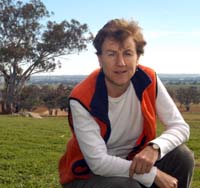 Food security has been flagged as one of the most serious issues to face the world in coming years, with predictions that by the year 2050 the world’s population will hit nine billion.
Food security has been flagged as one of the most serious issues to face the world in coming years, with predictions that by the year 2050 the world’s population will hit nine billion.But what does food security mean? Is Australia, as a food exporting country, immune to food security issues? And why is it that five per cent of Australian families suffer food insecurity?
These questions and more will be addressed in a forum titled “Food Security in Australia”, organised by Charles Sturt University’s (CSU) Institute for Land, Water and Society (ILWS) on Tuesday 30 October. The forum coincides with the launch of a new book examing food security from an Australian perspective.
“Much has been said recently in Australia about food security issues such as loss of productive land for housing, foreign ownership and investment in agricultural land; fairness of our food systems for producers, processors and consumers; food quality and diets; and exports to Asia and the Middle East,” ILWS social researcher, Dr Joanne Millar said.
Dr Millar, along with Associate Professor Vaughan Higgins from ILWS and Dr Quentin Farmar-Bowers from Deakin University, co-edited the book, Food Security in Australia: Challenges and prospects for the future, published by Springer Ltd.
“These issues are often dealt with as single issues when it comes to policies, planning and community action. What is needed is a more integrated way of dealing with the relationships between these issues,” Dr Millar said.
“For example, if Australia continues to operate by free trade to the cheapest commodity, will our food quality and employment in food production suffer? As Australians, do we leave ourselves vulnerable to global trends?
“If we continue to gobble up good farming land for urban use, will more inputs be needed? If we continue to hand out welfare payments and not help people to source and use nutritious food, are we just perpetuating poor diets and health problems in some Australian families?”
The book, which evolved from an Agri-food Network Conference held in 2010, is the first to deal with food security from an Australian perspective. It covers such topics as the ethical production of food; access of food through to different production systems; global trade versus local production; and more community driven agricultural systems.
Its release is timely as the federal government released a draft National Food Plan in July.
“The book aims to inform debate and stimulate further investigation and action on food security and ownership issues in Australia,” Dr Millar said.
“While there have been issues papers, academic publications and discussions on the issue, we wanted to bring it all together in the one publication and show that these are very complex issues that need to be considered together.
“The associated forum is an opportunity for people to join in the debate on food security issues in Australia, and to share ideas about what they can do in their own communities.”
The forum will be held on Tuesday 30 October, from 9am to 4pm in the CD Blake Lecture Theatre at CSU at Albury-Wodonga. The launch of the book by rural consultant Ms Cathy McGowan, AO, will mark the start of the forum.





Social
Explore the world of social